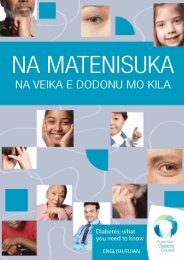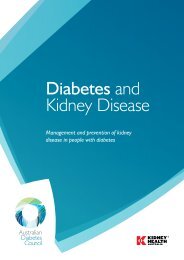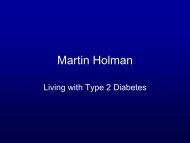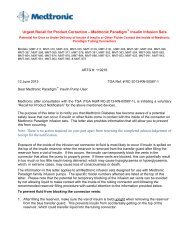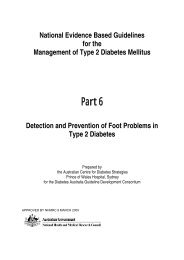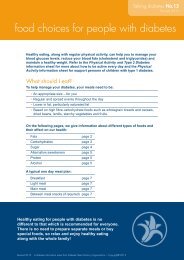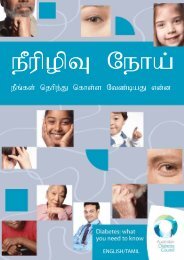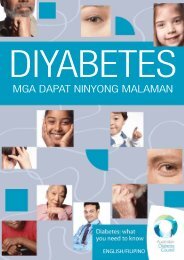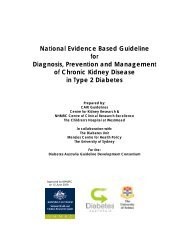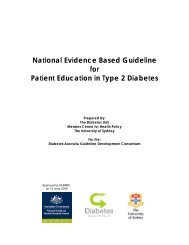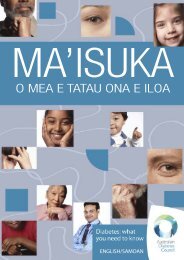Sugar - Australian Diabetes Council
Sugar - Australian Diabetes Council
Sugar - Australian Diabetes Council
Create successful ePaper yourself
Turn your PDF publications into a flip-book with our unique Google optimized e-Paper software.
Position Statement<br />
<strong>Australian</strong> <strong>Diabetes</strong> <strong>Council</strong>’s position on sugar<br />
<strong>Australian</strong> <strong>Diabetes</strong> <strong>Council</strong> calls for balanced eating, not fad diets<br />
November 2012 – Recently there has been significant public debate on the role of<br />
sugar in <strong>Australian</strong> diets and whether it is the cause of the obesity epidemic in Australia<br />
and around the world i .<br />
<strong>Australian</strong> <strong>Diabetes</strong> <strong>Council</strong> believes that it is important that <strong>Australian</strong>s take a balanced<br />
view to nutrition drawing on a range of foods, rather than focusing on single nutrients as<br />
‘good’ or ‘bad.’ No single nutrient is responsible for weight gain or loss. Total kilojoule<br />
intake from all food, however, is directly related to weight gain and loss.<br />
<strong>Australian</strong>’s relationship with food and our environment, and their roles in increasing<br />
rates of obesity, is complex. Although overall consumption of cane sugars had<br />
decreased then stabilised in the past 5 years, there has been a rise in the consumption<br />
of sugar in manufactured or processed foods. So it’s important for people to look at<br />
their overall lifestyle including their nutritional intake and discuss their personal<br />
circumstances with their health care team.<br />
Obesity is a very complex issue, and for this reason <strong>Australian</strong> <strong>Diabetes</strong> <strong>Council</strong><br />
advocates education about different foods, and improved nutritional literacy, with a focus<br />
on eating fresh, wholefoods.<br />
It is best to look at overall diet, focus on eating real foods, rather than focusing on single<br />
nutrients.<br />
We encourage those who are overweight, living with diabetes, or concerned about their<br />
diet to speak with health care professionals, such as accredited practicing dietitians.<br />
We support the need for greater public discussion and focus on food and nutrition.<br />
<strong>Australian</strong> <strong>Diabetes</strong> <strong>Council</strong> has a wide range of community programs which focus on<br />
teaching greater nutritional literacy, and we work for the interests of our members -<br />
people living with diabetes – every day.<br />
When discussing sugars, it is important to remember:<br />
• There are a number of types of sugar, such as lactose which naturally occurs<br />
in dairy, and fructose which naturally occurs in fruits and honeys<br />
• <strong>Sugar</strong>s, such as fructose, lactose, and those derived from starchy foods<br />
processed by the body, are essential nutrients in balanced amounts –<br />
providing the fuel for our brains, kidneys and red blood cells, as well as our<br />
muscles<br />
• Too many added sugars, as with added refined starches and fats, are a<br />
source of unnecessary kilojoules, which can lead to weight gain
About <strong>Diabetes</strong><br />
<strong>Diabetes</strong> is a chronic disease that is diagnosed when there are abnormally high levels of<br />
glucose (sugar) in the blood. More than three million or one in four <strong>Australian</strong> adults<br />
over the age of 25 have either diabetes or impaired glucose tolerance (pre-diabetes) ii .<br />
There are two main types: Type 1 (insulin dependent) diabetes, which represents 10-<br />
15% of cases; and Type 2 (non-insulin dependent but may be insulin requiring), which<br />
represents 85-90% of cases and may be prevented in around 60% of people at risk.<br />
About <strong>Australian</strong> <strong>Diabetes</strong> <strong>Council</strong><br />
Formed in 1938, <strong>Australian</strong> <strong>Diabetes</strong> <strong>Council</strong> is Australia’s oldest and largest not-forprofit<br />
organisation focused on providing support and services nationally and<br />
internationally to people living with and at risk of diabetes, their families, carers, friends<br />
and allied health professionals.<br />
As the peak consumer body for diabetes, the first diabetes organisation in Australia and<br />
the third oldest diabetes association in the world, we have a long history of successfully<br />
working with our members, creating a powerful shared voice for diabetes, now and in<br />
the future.<br />
We also play a vital role in informing the whole community about diabetes and its<br />
complications.<br />
2013 marks our 75th Anniversary and we look forward to celebrating with you all next<br />
year.<br />
<strong>Australian</strong>s can call <strong>Australian</strong> <strong>Diabetes</strong> <strong>Council</strong> on 1300 DIABETES or 1300 342 238, or<br />
visit www.australiandiabetescouncil.com for more information or to make a donation.<br />
References<br />
i Lustig, R H et al, ‘Public health: The toxic truth about sugar’, Nature, 2012 vol 27-29<br />
ii AusDiab 2005. IDI, 2006



